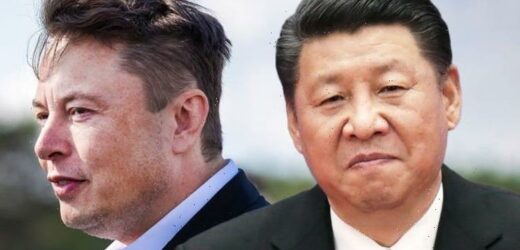Steve Baker says China 'isn't ready to do deal at COP26'
We use your sign-up to provide content in ways you’ve consented to and to improve our understanding of you. This may include adverts from us and 3rd parties based on our understanding. You can unsubscribe at any time. More info
China is presently in the midst of an energy crisis triggered, in part, by the rising price of coal. The country’s tightening grip on greenhouse emissions and the poor management of provincial energy rationing have further fuelled the chaos, leaving houses, businesses and factories in the dark. Elon Musk, whose tech empire relies on the smooth operation of China-based manufacturers, has already felt the impact of the energy crisis.
The power crunch has halted production at a number of factories supplying the South African billionaire’s electric car company, Tesla.
The Eson Precision Engineering company in Kunshan, Jiangsu province, was forced to temporarily suspend the production line.
The company said: “The company will leverage its inventory to maintain the operation while production is halted.
“We expect to arrange production on the weekends or in the upcoming holidays [next month] to meet customers’ needs.”


Some experts fear the worst is yet to come and economists have predicted a slump in China’s economic growth as a result of the disruptions.
The Nomura group, for instance, slashed its growth forecasts from 8.2 percent down to 7.7 percent.
And the impact is expected to reach far beyond China’s borders, affecting tech giants like Tesla and Apple.
Mr Musk has now shared his concerns about China’s energy crisis, responding to the news on Twitter.
He tweeted on Tuesday: “This is a serious concern.”
The Heilongjiang, Jilin and Liaoning provinces in northeast China experienced a particularly severe outage on Monday, which local media have described as “unexpected and unprecedented”.


According to the state-run Global Time newspaper, the outages have “resulted in major disruptions to the daily lives of people and business operations”.
Chinese officials have urged manufacturers and factories to limit their consumption, with energy rationing also affecting homes and small businesses.
Scenes of chaos unfolded in Shenyang, the capital of Liaoning province, where a sudden outage caused traffic lights to fail, trapping motorists inside of their cars.
China’s growth forecasts have also been slashed by economists at Goldman Sachs on Tuesday.
Their 2021 GDP growth forecast fell from 8.2 percent down to 7.8 percent, as a result of “recent sharp cuts to production in a range of high-energy intensity industries”.
Tesla: Elon Musk details plans to create humanoid robot
Goldman Sachs’ experts estimated up to 44 percent of China’s industrial activity has been hit by the chaos.
The economists said: “The peculiar nature of the Covid shock has made the economy more energy-intensive, at least temporarily.”
The experts added efforts to reduce China’s dependency on coal for power has also affected supply levels and contributed to a “sharp increase in price”.
China’s is the world’s leading carbon dioxide (CO2) polluter but has committed to reducing its greenhouse emissions.
In a comment piece for The Telegraph, International Business Editor Ambrose Evans-Pritchard claimed the crisis is going to “rock the whole world”.
He attributed the crisis to the fallout of the Covid pandemic, and the intermittent nature of renewable energy sources like wind and hydroelectric power.
He wrote: “China’s energy crunch is happening for much the same reasons as in Europe.
“Covid upset the rhythms of the global fuel market.
“The weather was extreme: drought hit hydro-power, and the hot summer boosted air conditioning.
“The result was an explosion in demand for coal and gas.”
Source: Read Full Article

